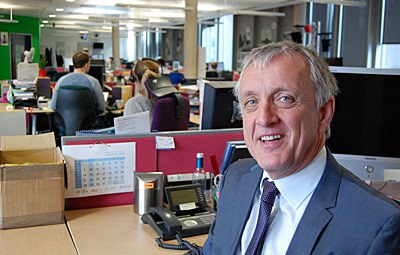 Mick Ord
Mick Ord
The decorating of my bathroom on Green Lane North remained unfinished after just a few hours of effort on the afternoon of Saturday 15th April, 1989.
Such was, and is, my lack of painting skills that it was with a sense of relief I went downstairs to take a phone call from the newsroom, presuming to be told of a rota change or a story idea for Monday’s programme.
My job in 1989 was producing the Roger Phillips programme on BBC Radio Merseyside and I was called into work, along with so many others, because something serious was amiss at Hillsborough where Liverpool were playing. There were reports from our commentator that people were hurt.
Again.
The 1980s on Merseyside
Just a few years before, 39 Italian football fans had been crushed to death at the Heysel Stadium in Brussels where Liverpool had been playing Juventus in the European Cup Final. Liverpool FC, the club that for years had prided itself on having ‘the best behaved supporters in the land’, had had its name dragged through the mud because of violence among supporters at a ground unsafe to stage such a high-profile game.
 The Heysel Stadium disaster in 1985
The Heysel Stadium disaster in 1985
I had been the main Radio Merseyside reporter covering the ensuing trial of the English fans accused of manslaughter and we’d continued to follow the progress of the case and its repercussions.
That disaster had resulted in English clubs being banned from European competition, with Liverpool FC sidelined for 10 years.
And now this.
Surely the horrors of Heysel weren’t being repeated? Surely not.
At the radio station the programme schedules were thrown into the bin and staff and listeners descended on the studios as they heard the news, both in person and over the phone.
A phone-in with the late presenter Bob Azurdia (who happened to be in the studio editing at the time) was immediately put on air with me as producer. Then, when Roger Phillips came in he took over presentation duties, as the number of reported dead increased minute by minute.
What had started as a football match turned into a tragedy. And a major news story. A turning point had been reached not only for the victims, the families and the football authorities but for policing and safety in the UK.
Our brief in 1989 was to stay in touch with every twist and turn of the enfolding story.
The power of local radio
In the days before the internet and social media, the airwaves provided an ever-present platform for listeners’ sadness and anger and, perhaps most importantly, the calling to account of the authorities – not an easy task to carry out objectively in a city where one was reminded every day of the hurt and injustice which people felt had been inflicted on them.
We extended the daily phone-in from 90 minutes to 2 hours 30 minutes. Every day for three weeks the only phone calls we received were on the subject of the disaster and what had really happened.
Our job as a radio station was to reflect the anger but also to question the authorities and ask hard questions of people on all sides. As the story was developing there seemed to be in some media quarters an assumption that Liverpool fans were in some way guilty, or partly guilty, for what had happened.
Former players lead renewed call for boycott of The Sun in wake of Hillsborough verdictA bit like Heysel.
A bit like Militant.
A bit like the Toxteth riots.
Well no, actually. But when you’re not reporting on a story on a daily basis, writing copy from another part of the country, it can be a bit too easy to make assumptions and feed your prejudices and pre-conceptions. And the cliche of bolshie Scouse trouble-makers achieved mythic status among some of Wapping’s finest.
Liverpudlian exceptionalism?
John Morrish in The Tablet a few years ago perceptively reviewed a documentary on Hillsborough: “At one point, the story slipped sideways into an account of Liverpool’s sufferings in the 1980s, when it was dubbed ‘the Bermuda Triangle of British capitalism’. This, it was suggested, led to the bad reputation of Liverpudlians, and to the blaming of the fans for their own deaths.
“All this came close to what you might call Liverpudlian exceptionalism: the idea that residents of that city are, on the one hand, particularly witty and talented and, on the other, particularly hard done by.
“Would football fans from any other city crushed to death on Saturday afternoon… really have been treated any differently? I doubt it.”
In some ways this ‘Liverpudlian exceptionalism’ came of age in the 1980s. From the inside it seemed that the city was never out of the front pages and in the national news. It seemed we were different – but not in a Beatley, ‘everyone’s-a-comedian’ kind of way.
 The BBC’s Liverpool-set sitcom, Bread
The BBC’s Liverpool-set sitcom, Bread
In the 80s, the media spotlight seemed to be regularly on Liverpool in all sorts of ways. We’d had Alan Bleasdale’s ground-breaking tv drama Boys from the Blackstuff which inspired, horrified, brought despair and hope, all at once. Then there was Carla Lane’s hugely popular (outside Merseyside) comedy soap Bread, which lampooned the perceived lives of ‘typical’ Scouse social security scroungers.
In the news bulletins,the Militant-led Labour council clashed with anyone who was up for a fight including Thatcher AND Kinnock, the latter memorably on our TV screens during the Labour Party conference.
Throw all this into the mix and you have the makings of an exceptional media image.
Every Merseysider of a certain age can remember the headlines proclaiming ‘self-pity city’ and, of course the Sun’s infamous ‘The Truth’.
Indeed when you look at the long list of Liverpool-related news stories it’s not surprising that many of the city’s inhabitants adopted a siege mentality towards sections of the media, some of which continues today with the famous boycott of the Sun.
But it wasn’t just that paper, although it might seem like that now.
I recall the late and much-respected editor of the Daily Mirror, Richard Stott, coming on BBC Radio Merseyside to defend his paper’s front-page coverage of the tragedy when the crushed faces of fans against the railings were featured in graphic horror.
When asked what he would feel if his children’s faces had been featured in such a way he gave what our listeners deemed to be a feeble explanation.
The Radio Merseyside phone-in was extended to two and-a-half hours every lunchtime and for three weeks the only calls we received were about Hillsborough.
How the North’s regional newspapers covered the Hillsborough storyThen, at least for people who didn’t lose loved ones in the tragedy, or who weren’t involved in the fight for justice, the Hillsborough ‘story’ only resurfaced in public when the anniversary occurred or when there was a significant legal turning point.
The Hillsborough Panel’s ground-breaking report in September 2012 helped to change the national perspective on the tragedy, albeit 23 years after the event.
If you want to call this long, rocky road ‘Liverpudlian exceptionalism’ then so be it. Indeed in 2006 an excellent book of essays was published about the history of scouse exceptionalism by history Professor John Belchem from the University of Liverpool.
But is the 27-year long battle for truth and justice a shining example of Liverpudlian exceptionalism?
The families and campaigners might accept that accolade. Ultimately though I think they would classify it as a struggle for justice and truth – which is still not over.
And that’s exceptional in anybody’s language.
Mick Ord today runs his own media relations consultancy








